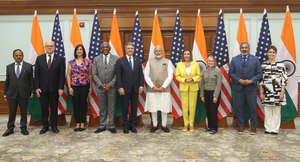America
USIBC Hosts US Congressional Delegation in Delhi to Discuss Defense and Tech Cooperation

June 21 :
The US-India Business Council (USIBC) of the US Chamber of Commerce held an exclusive member interaction with Representative Michael McCaul and the US congressional delegation. Discussions centred on how to strengthen defence and strategic technology industry cooperation between the United States and India. The bicameral delegation comprised of Chairman McCaul, Mariannette Miller-Meeks, and former US House of Representatives Speaker Nancy Pelosi. US Representatives Gregory Meeks, Nicole Malliotakis, Jim McGovern, and Ami Bera were named in the USIBC press release.
In a statement issued on Thursday, USIBC said, "The US Chamber of Commerce's US-India Business Council (USIBC) hosted a closed-door member interaction with a senior delegation from the U.S. House of Representatives led by Representative Michael McCaul (R-TX), Chairman of the House Foreign Affairs Committee, in New Delhi today."
"The interaction focused on enhancing industrial cooperation between India and the United States in defence and strategic technologies, reflecting the two countries' common interest in promoting peace and stability in the Indo-Pacific region based on democratic values," according to the report.
According to USIBC Managing Director Alexander Slater, who is based in Delhi, businesses in both India and the US are rapidly becoming more important in the fight for a "free, open, prosperous and peaceful Indo-Pacific." According to Slater, "Today's meeting between senior US Congressional officials and members of the US-India Business Council shows that closer strategic cooperation between India and the United States enjoys broad-based political support in America."
To achieve its development goals, India must have a free, open, wealthy, and peaceful Indo-Pacific region, and businesses from both nations are playing an increasingly important role in this effort. What keeps these results going—innovation, new jobs, and robust supply chains—is driven by industry. In his capacity as an official partner of the two countries on various platforms, including the Initiative on Critical and Emerging Technologies and the defence innovation bridge INDUS X, he went on to say that USIBC is delighted to offer its assistance to this endeavour.
A group of US lawmakers met with the Dalai Lama, a spiritual leader from Tibet, in India on June 18. At Kangra Airport, representatives from the Central Tibetan Administration welcomed the American group.
The meetings between US National Security Advisor Jake Sullivan and Indian National Security Advisor Ajit Doval in New Delhi focused on enhancing bilateral strategic cooperation on critical and emerging technologies, according to the USIBC press release. The visit of the US Congressional delegation occurred the same week.
Held annually by the initiative on Critical and Emerging Technology (iCET) between the two nations, the meeting was attended by National Security Advisor (NSA) Ajit Doval and his US counterpart Jake Sullivan on June 17.
The national capital was the site of the negotiations between the delegations. Over the course of two days on June 17th and 18th, the two nations will host their second iCET meeting. In January of last year, the United States hosted the first gathering.
At the summit, the two countries' leaders committed to working together more closely on supply chain issues, semiconductors, and essential minerals. In order to collaborate on the design and production of semiconductors for precision-guided ammunition, the two countries have established a new strategic semiconductors collaboration.
"Launching a new strategic semiconductor partnership between General Atomics and 3rdiTech to co-develop semiconductor design and manufacturing for precision-guided ammunition and other national security-focused electronics platforms," according to the US and the country. The development of indigenous skills in semiconductors has become a hotly contested geopolitical issue, as the US, Japan, and China all rely on them for defence, vehicles, and telecommunications.
"Celebrating the conclusion of a joint Semiconductor Readiness Assessment through a partnership between the US Semiconductor Industry Association and the India Electronics Semiconductor Association, which identifies near-term industry opportunities and facilitates longer-term strategic development of complementary semiconductor ecosystems," according to the document.
With the help of American and Indian investors, India's semiconductor industry will be able to keep growing, which will benefit the country's IT sector as a whole. Dholera, Gujarat will be home to India's first semiconductor fabrication plant (fab) thanks to a partnership between Tata Electronics and PSMC, a company based in Taiwan. A semiconductor unit will be established at Morigaon, Assam, by Tata Semiconductor Assembly and Test Pvt Ltd (TSAT). A semiconductor unit will be established in Sanand, Gujarat, by CG Power in collaboration with Stars Microelectronics of Thailand and Renesas Electronics Corp of Japan. Critical minerals are vital for renewable energy technology and other major industries; the United States and India want to collaborate in this regard.
"Promoting India's vital role in the Mineral Security Partnership, including through co-investing in a lithium resource project in South America and a rare earths deposit in Africa, to responsibly and sustainably diversify critical mineral supply chains," according to the document.



































